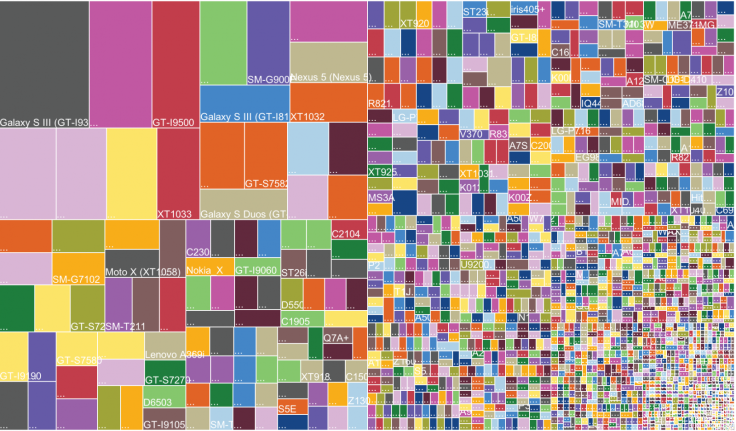Android Fragmentation Continues to Grow With 18,786 Different Devices Seen This Year

The number of different Android devices on the market rose by 7,000 in the last 12 months, with 43% of them coming from Samsung.
According to the latest figures from OpenSignal, a company specialising in wireless coverage mapping, says that there are 18,786 different Android devices in use around the world. While this provides headaches for app developers trying to code software for a huge variety of hardware, it also means that Android smartphones and tablets are available at price points which are not being catered for by other manufacturers - notably Apple.
The Android operating system is the most fragmented it has ever been
"Fragmentation is both a strength and weakness of the Android ecosystem, a headache for developers that also provides the basis for Android's global reach. Android devices come in all shapes and sizes, with vastly different performance levels and screen sizes," the report says.
According to OpenSignalMaps, which published its latest report on Friday, its app was downloaded by 18,786 distinct devices over the last couple of months, up from 11,868 devices in 2013 and 3,997 in 2012. The data is based on a sample of 682,000 devices surveyed, which is identical to the sample from previous two years.
Samsung dominates
Samsung is the dominant force in the Android market, with a 43% share of the market according to these figures. The company also made 12 of the 13 most popular devices on the market.
However, just as its grip of the overall smartphone market has slipped, its share of the Android market has also dropped with the South Korean giant recording a 47.5% share in 2013.
Highlighting just how far ahead of the competition Samsung is, the second most popular Android manufacturer is Sony with just 4.8% market share.
Software fragmentation

As well as having over 18,000 devices to code for, developers are also having to deal with many different versions of the software being in use, with OpenSignal's 2014 report concluding that "the Android operating system is the most fragmented it has ever been".
The report says that Android has capitalised on the decline of Nokia's Symbian platform particularly in "less economically developed countries".
The report also highlights the which version of Android is being used in a particular countries directly correlates to the economic development of that country:
"Building an app for an economically developed market is a lot easier, with many more devices on the most recent Android versions, with around 35% of devices in more economically developed countries on Android Kitkat, compared to around 12% for less economically developed countries."
The fragmented nature of Android software is best illustrated by comparison to iOS, with the pie charts below showing just how less fragmented Apple's platform is.

Despite the huge proliferation of devices and versions of the software itself, fragmentation of Android has not damaged its ability to capture an increasing percentage of the smartphone market.
According to the latest figures from research firm IDC, in the second quarter of 2014 Android had almost 85% of the market, up from 79% during the same period of 2013.
© Copyright IBTimes 2025. All rights reserved.






















